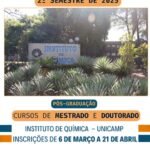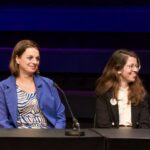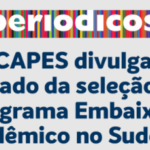Boron, Fluorine and Synthesis – Let’s probe where they’ll take us
Palestrante: Dr. Emmanuel GRAS (University Paul Sabatier – França)
Abstract: The Boron–Fluorine bond is known as one of the strongest in terms of bond dissociation energy (BDE). This makes it a highly interesting association for in vivo imaging purposes. Yet BDE refers to homolytic cleavage and thus the actual stability of BF adducts can be highly variable depending on their environment. Through this presentation we will show how BF derivative can be stabilized and how some boron containing compounds can achieve the vectorization of the fluorine atom to reach fluorinated compounds of potential interest in health-related sciences.
Short CV: Laboratoire Hétérochimie Fondamentale et Appliquée (LHFA) UMR5069 – CNRS University Paul Sabatier – Toulouse III ; 118 Route de Narbonne, 31062 Toulouse Cedex 9. Academic degrees: Habilitation, Paul Sabatier Toulouse III University (2010); Ph.D. from Paris XI – Orsay University (2000); Master degree from Paris XI – Orsay University (1997); Bachelor from the University of Orleans (1995). Current Position: Tenured CNRS researcher since 2002 in Toulouse; [‘k]ISS Team leader; Head of the Trans-NMDA Joint Laboratory. Former position: Marie Curie Research Fellow – Department of Chemistry (Dyson Perrins Laboratory) – University of Oxford. Research outcomes: 63 Publications, reviews, patents and book chapters; 26 oral presentation in conferences; 18 invited conferences in universities, academic and private research centers. Research Activities: As a group leader at the LHFA, and from my previous positions at the CNRS, I have supervised more than 15 PhD Student, 6 post doctoral research and 40 interns. Our research deals with organic synthesis of biologically active molecules toward in vivo medical imaging (18F & PET), fluorescent probes especially involving boron, and synthetic method development such as cascade carbene transfert – sigmatropic rearrangement. Since November 2024, I’m leading a new joint public/private research laboratory dedicated to the study of NMDA receptors (structure, activity and selective inhibitors). Involvement in Management: Beside research, I have always taken the time to be involvement in the management activities of the research centres, our institution and the French chemical society. As such I have been member of the selection and evaluation board of the CNRS (Section 12 – Molecular Chemistry); member of the board of the laboratories I have been working in since 2002; president of the board of local division of the French Chemical Society, member of the board organic chemistry division of the French Chemical Society, member of the national administrative board of the French Chemical Society. Academic collaborations: I always considered essential to exchange with colleagues in Chemistry and related fields, with a specific dedication to international collaboration in order to nurture new research directions. From that perspective I have created strong connections with colleagues from Americas as well as within France & Europe.
Prof. Responsável: Júlio Cezar Pastre





